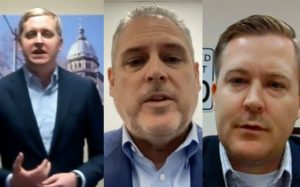House Republicans urge responsibility in use of federal stimulus dollars
By Tim Kirsininkas Capitol News Illinois — March 12, 2021
State Reps. Tom Demmer, R-Dixon, Keith Wheeler, R-Oswego, and C.D. Davidsmeyer, R-Jacksonville, speak during a virtual news conference on Friday, March 12. (Blueroomstream.com)
SPRINGFIELD – One day after President Joe Biden signed a $1.9 trillion economic stimulus package, Illinois House Republicans called for the General AssemblyGeneral Assembly to oversee the appropriation of funds in order to support businesses and individuals most impacted by the COVID-19 pandemic.
In a Friday, March 12 news conference, state Reps. Tom Demmer, R-Dixon, Keith Wheeler, R-Oswego, and C.D. Davidsmeyer, R-Jacksonville, urged responsibility in the allocation of federal funding and warned against using the stimulus as a “magic bailout” to fund new state programs.
“These are dollars that are designated by the federal government to provide relief to the governments, businesses and individuals and families across the country who have been impacted by COVID-19 and the related closures and restrictions of everyday life that we’ve all been through,” Demmer said March 12.
The state will receive more than $7 billion through the economic relief package and more than $5 billion will go to local governments.
Democrats in a committee hearing Thursday, March 11 also argued for more General Assembly oversight, and Illinois Comptroller Susana Mendoza has warned that much of the money the state receives should be used to pay back over $3 billion the state borrowed from the Federal Reserve in response to the pandemic.
Demmer agreed that the state should use the federal dollars to pay off borrowing and the state’s existing bill backlog, which numbered $5.4 billion as of March 12, according to the comptroller’s website.
“We think it’s very important that we exercise fiscal restraint through this process,” he added.
Demmer called for the federal funds to be directed primarily towards small businesses that have been most impacted by ongoing closures amid the pandemic.
“It’s very important as policymakers that we consider who is really in the most need of COVID relief dollars, and in many cases that’s small business owners across the state of Illinois who have seen their businesses closed or restricted or heavily impacted for almost a full year now,” Demmer said.
As part of previous federal relief packages, the state allocated $580 million in Business Interruption Grants that went in part to small businesses. Half of that allotment also went to child care providers.
Wheeler again called for Gov. J.B. Pritzker to reinstate tax credits offered through the Blue Collar Jobs Act, a set of bipartisan economic reforms passed in 2019. Pritzker has frozen the tax credits which he signed into law in 2019, referring to them as “tax loopholes” that hurt the state financially.
Wheeler said that in doing so, Pritzker has “undermined” the bipartisan budget package passed in his first year as governor.
“It was supported by both labor and business groups, and the tax rates only become available after the work has been fully completed so there’s no risk for the state,” Wheeler said.
Davidsmeyer called for the General Assembly to work together with the governor to decide on how the federal dollars would be allocated.
“We still have to make some difficult decisions,” Davidsmeyer said.
“I think we need to get together, sit down, be transparent in this process, and work together to pass a truly balanced budget that doesn’t use the federal dollars to fill holes, but to get us out of the holes,” he added.
Demmer said communication between the General Assembly and the governor’s office would be key to setting the state on a favorable trajectory as Illinois begins to recover from the year-long COVID-19 pandemic.
“The legislature needs to use our power of the appropriation process to control money and to make sure that a significant portion goes to provide COVID relief to the businesses, to the communities, to the families who have been so dramatically impacted by this,” Demmer said.
Demmer also warned against using the stimulus to cover day-to-day expenses of programs and state services in Illinois, saying instead that the funds should be used strictly for the state’s economic recovery.
“It’s really our choice whether this is COVID relief, or whether this is a bailout of a system that was flawed long before anybody ever heard the word COVID,” Demmer said.
tkirsininkas@capitolnewsillinois.com







